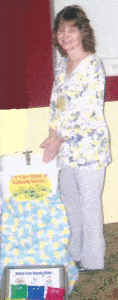Elaine Tiller, Nutrition Outreach Instructor with the West Virginia Family Nutrition Program in Princeton knows her way around a food safety class.
Program in Princeton knows her way around a food safety class.
Raising Awareness of Home Food Safety Steps
She found the Story of Your Dinner video (storyofyourdinner.org) to be an effective tool for raising awareness of the food safety steps needed at home to keep family meals safe. Elaine offers Eating Smart Being Active classes through West Virginia University Extension. Her program targets adults with limited resources who are parents with children in Head Start. She also teaches a class to vocational high school seniors.
Video Hits the Mark
Elaine used the Story of Your Dinner pre-and post-video viewing evaluations to assess the success of the presentation. Viewers learned they shouldn’t rinse chicken before cooking it. It also reinforced the importance of hand washing before and after handling food—steps Elaine reviews in her classes also.
Other Story of Your Dinner resources were popular with the class participants as well. The placemats were a hit, and the recipes with food safety instructions were approved for use in classes by the staff supervisor, an RD. Elaine intends to use them in future cooking classes.
Thermometers Bring Food Safety Home
Class participants receive their own instant read food thermometer to use at home, along with a FightBAC temperature chart which Elaine downloads from the website, laminates, and adds a magnet to. This way class participants can hang it right in their kitchen- handy for when using their new food thermometer!
“Sink Those Germs!”
For teaching the kids- Elaine developed the “Sink those Germs” game for health fairs. She uses a “sink” made from a dish pan with an added a spigot and bean bag “germs”. Children are quizzed on when they are supposed to wash their hands and when they answer correctly, they toss those nasty germs (bean bags) into the “sink” and down the drain.
